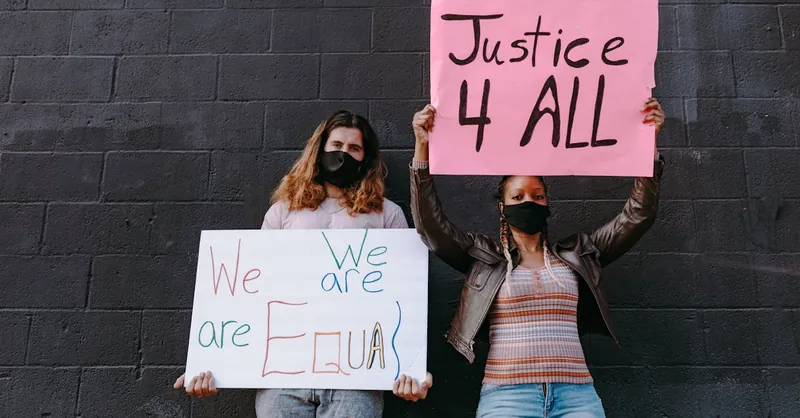Karens Disrupting Businesses: Unpacking Entitlement and Chaos
Category: Social Issues
When Entitlement Disrupts Commerce: Understanding Karens in Business
In today’s socially conscious environment, many readers have witnessed or heard of the now infamous "Karen" phenomenon—individuals whose entitlement and disruptive behaviors create chaos, especially in business settings. If you've navigated public spaces or own a small business, you know how a single entitled customer can escalate conflicts, damage morale, and threaten fairness. This post delves into how Karens disrupt businesses, the social psychology behind their actions, and the broader implications for justice and workplace equity.
You’ve likely found this article because you’re tired of seeing unfairness amplified by entitled demands, or perhaps you’re searching for ways to manage or understand these difficult interactions. Unlike generic articles, this piece goes beyond the surface, offering critical cultural commentary and actionable insights tailored for readers who want to grasp the roots of this problem and its impact on businesses. We acknowledge your awareness of social justice and your frustration with the imbalance such behaviors cause.
Our goal is to equip you with a well-rounded perspective on the entitlement mindset and its consequences in commercial spaces. Keep reading to explore real-world examples, psychological motivations, and expert strategies to respond to and mitigate these disruptive episodes within businesses.
- When Entitlement Disrupts Commerce: Understanding Karens in Business
- Defining the Karen Phenomenon: Origins and Cultural Context
- Common Scenarios: How Karens Disrupt Business Operations
- Psychology Behind the Entitlement: What Fuels Karen Behavior?
- Impact on Employees: Emotional and Operational Toll
- Effects on Business Reputation and Customer Experience
- Legal and Ethical Considerations for Businesses
- Effective Strategies for Managing Karen Disruptions
- Broader Social Justice Implications: Equity Versus Entitlement
- Role of Social Media: Amplification and Accountability
- Preparing for the Future: Cultivating Empathy and Fairness in Customer Relations
Defining the Karen Phenomenon: Origins and Cultural Context
The term "Karen" has evolved from a simple meme into a widely recognized cultural archetype representing entitlement, privilege, and often, unreasonable demands directed at service workers and businesses. Although the exact origin is murky, the Karen stereotype gained momentum in the early 2010s through social media platforms like Twitter, Reddit, and TikTok, where viral videos highlighted individuals—typically middle-aged white women—exhibiting aggressive, entitled, and often racially tone-deaf behaviors. This archetype embodies a specific kind of performative entitlement, where individuals feel inherently entitled to preferential treatment regardless of fairness or business policy.
In media and social discourse, the Karen phenomenon is not just about an individual’s rude behavior but serves as a cultural shorthand for systemic entitlement and privilege. The Karen stereotype illustrates how entitlement disrupts social and commercial interactions, especially in public-facing businesses like retail, hospitality, and service industries. Businesses frequently bear the brunt of these disruptions, as Karens escalate conflicts by demanding unwarranted exceptions, often creating hostile environments and unfair situations that pit employees against customers or management against patrons.
Key factors contributing to the Karen phenomenon include:
- Social media amplification, which exposes and spreads examples of entitlement-driven behavior.
- Cultural awareness of privilege, particularly racial and social, framing the Karen as more than just rude—often seen as enforcing systemic inequalities.
- Entitlement as central behavior, underpinning the insistence on bending or breaking rules to satisfy personal demands.
Understanding the roots and cultural context of the Karen archetype is crucial for recognizing why their behavior is not isolated rudeness but a symptom of deeper entitlement issues that directly disrupt businesses and the principles of fairness they strive to uphold.

Image courtesy of Tima Miroshnichenko
Common Scenarios: How Karens Disrupt Business Operations
Entitled behaviors exhibited by Karens often follow predictable patterns that severely disrupt normal business operations, causing stress for employees, frustration for other customers, and sometimes even financial losses for the establishment. These common scenarios illustrate the various ways Karens undermine service flow and workplace harmony, revealing the underlying entitlement that drives their actions.
Refusal to Follow Established Rules
One widely seen disruptive tactic is the outright refusal to adhere to clearly communicated rules and policies. Whether it’s ignoring mask mandates, bypassing queue systems, or demanding exceptions to refund policies, Karens display a blatant disregard for business protocols designed to ensure fairness and safety. This refusal not only stalls service but forces employees into difficult confrontations, slowing down operations as staff juggle enforcement and customer service.
Aggressive and Unreasonable Demands
Karens often leverage an aggressive tone to escalate their demands beyond reason, attempting to coerce employees or managers into providing preferential treatment. Examples include insisting on immediate escalations to upper management, demanding free products or services without valid cause, or expecting personalized privileges unavailable to other customers. This aggressive approach disrupts typical business workflows, pulling resources away from serving the broader customer base.
Disrespect and Hostility Towards Employees
A defining characteristic of Karen behavior is disrespect—manifested through condescending language, rude remarks, or outright hostility directed at frontline workers. This behavior not only harms employee morale but creates a toxic environment, increasing staff turnover and reducing overall service quality. Employees facing such disrespect are often less able to provide the attentive, positive service that businesses depend on.
Escalation Tactics That Stall or Shut Down Service
When initial demands are denied, Karens frequently escalate the situation through threats—such as calling corporate, leaving negative reviews, or even involving law enforcement. These escalation tactics can grind service operations to a halt as management diverts attention to conflict resolution rather than routine business activities. In extreme cases, such disruptions can lead to temporary closures or loss of clientele, illustrating how individual entitlement can ripple into broad business consequences.
By understanding these common disruptive behaviors, businesses and patrons alike can better recognize when entitlement-driven actions are at play, making it easier to develop strategies that protect fair service and uphold respectful interactions in commerce.

Image courtesy of Kampus Production
Psychology Behind the Entitlement: What Fuels Karen Behavior?
To truly grasp why Karens engage in disruptive and entitled behavior, it’s essential to explore the psychological forces that fuel this phenomenon. At the core are intertwined concepts such as entitlement syndrome, privilege perception, and social dominance theory, which together illuminate the mindset driving these actions. Understanding these factors is key for businesses and society to address and mitigate the damage caused by such disruptive encounters.
Entitlement Syndrome: A Sense of Inherent Privilege
Entitlement syndrome describes an individual’s belief that they inherently deserve special treatment or exemptions from rules and social norms. Karens often display this syndrome by perceiving business policies and employee boundaries as obstacles to their personal satisfaction rather than equitable safeguards. This mindset is reinforced by past experiences where privilege enabled them to bypass consequences or gain immediate compliance, embedding a learned expectation of preferential treatment.
Key traits associated with entitlement syndrome include:
- Expecting automatic compliance from service providers, regardless of policy or fairness.
- Feeling grievance or victimhood when demands are denied, even if those demands are unreasonable.
- Low empathy toward employees, viewing them as impediments rather than individuals.
Privilege Perception: The Invisible Framework
Many Karens operate from a place of unacknowledged social privilege, particularly in contexts relating to race, gender, or socioeconomic status. This unrecognized privilege fosters a worldview where rules are seen as flexible or negotiable—primarily enforced on others, not themselves. Privilege perception allows such individuals to justify their entitlement as a natural extension of their social identity, often ignoring the disproportionate impacts their behavior has on marginalized workers and customers.
Social Dominance Theory: Maintaining Hierarchies Through Interaction
Social dominance theory helps explain how Karens’ behaviors function as a means to maintain hierarchical social structures and dominance. By using their perceived status to demand special treatment, Karens actively reinforce systems of inequality, asserting control in public and commercial spaces. This dynamic often manifests as active suppression or disrespect toward service employees—disproportionately women, minorities, or younger workers—which perpetuates existing social imbalances.
Together, these psychological elements create a potent mentality that fuels entitlement-driven disruptions in businesses, turning individual interactions into microcosms of broader social injustice. Recognizing this allows businesses to develop informed approaches to managing Karen behavior—balancing firm policy enforcement with efforts to de-escalate conflicts grounded in these underlying psychological drivers.

Image courtesy of cottonbro studio
Impact on Employees: Emotional and Operational Toll
The disruptive behavior of Karens takes a significant emotional and operational toll on frontline employees, creating ripples that affect not only individual workers but the entire business ecosystem. When confronted with entitled demands, aggressive attitudes, or outright hostility, employees often experience elevated levels of stress and anxiety, which can severely undermine their ability to perform and maintain a positive attitude at work. This emotional burden leads to lowered morale, making it difficult to sustain the energy and patience required for customer-facing roles.
Beyond the emotional impact, Karen-induced conflicts also cause operational disruptions. Employees spend valuable time managing unreasonable complaints or mediating escalations rather than focusing on normal service tasks. This diversion of attention slows down workflows, reduces overall team productivity, and negatively impacts the customer experience for others. Repeated exposure to such toxic interactions frequently results in increased staff turnover, as many frontline workers leave to escape a hostile work environment, forcing businesses to incur the costs of recruiting and training replacements.
Key consequences of Karen behavior on employees include:
- Chronic stress and burnout, which can lead to mental health challenges such as anxiety and depression.
- Decreased job satisfaction, lowering employee engagement and pride in their work.
- Heightened conflict fatigue, where continual confrontations become emotionally draining and demotivating.
- Higher absenteeism and staff attrition rates, impacting business stability and consistency of service.
- Reduced team cohesion and morale, as coworkers are influenced by negative experiences and stressful environments.
Understanding the profound emotional and operational costs that Karen disruptions impose on employees highlights the urgent need for businesses to implement comprehensive support mechanisms, clear policies, and effective training. Protecting workers from entitlement-driven conflicts is essential not only for maintaining a respectful workplace but also for safeguarding business continuity and customer satisfaction in the long term.

Image courtesy of Yan Krukau
Effects on Business Reputation and Customer Experience
When Karen incidents go viral or gain widespread attention, the damage extends far beyond the immediate disruption, striking at the very heart of a business’s reputation and its ability to foster a positive customer experience. These highly publicized episodes often paint the business in a negative light, regardless of fault, as audiences associate the conflict with poor management, unfair policies, or unwelcoming environments. This phenomenon can erode consumer trust and drive potential customers away, creating long-term financial and brand sustainability challenges.
How Viral Karen Incidents Harm Brand Perception
-
Widespread Negative Publicity
Viral videos and social media posts capturing a Karen's entitlement-fueled meltdown rapidly spread, exposing the business to millions of viewers. Even well-intentioned policies or staff efforts become overshadowed by the spectacle of conflict, leading to reputational damage that is difficult to control or reverse. -
Perceived Poor Customer Service
When the story centers around a customer complaint—even if unwarranted—the public often sympathizes with the entitled individual, unfairly blaming the business or its employees. This perception fuels narratives that the business lacks empathy or fairness, harming future customer acquisition and retention. -
Association with Toxic Environments
Recurring Karen incidents contribute to the impression that a business environment tolerates or invites conflict, making other customers hesitant to engage or spend time there. The idea of a hostile or stressful setting discourages foot traffic and repeat visits, directly impacting revenue.
Alienating Other Customers and Threatening Long-Term Sustainability
-
Disruption to the Overall Customer Experience
Entitled disruptions create tense atmospheres that diminish the enjoyment and comfort of other patrons. Customers witnessing confrontations may feel uneasy or unsafe, prompting them to avoid the establishment in favor of competitors. -
Resource Drain and Service Slowdowns
Handling escalated requests and complaints from Karens often requires disproportionate managerial attention, drawing resources away from efficiently serving the broader customer base. This imbalance compromises service quality, further alienating patrons. -
Negative Online Reviews and Brand Backlash
Karens frequently weaponize review platforms with unfair negative feedback, amplifying damage to brand reputation. Potential customers relying on online ratings may choose competitors based on these skewed perspectives, undermining long-term business viability.
In sum, the viral spread of Karen incidents not only disrupts operations but damages the intangible assets businesses rely on the most: brand reputation and customer loyalty. For businesses committed to fairness and inclusivity, these disruptions present a critical risk that calls for proactive reputation management, clear communication strategies, and empowered staff training to defuse entitlement-driven conflicts before they escalate.

Image courtesy of Mikhail Nilov
Legal and Ethical Considerations for Businesses
Navigating interactions with entitled and hostile customers—often dubbed "Karens"—requires businesses to balance legal obligations, ethical responsibilities, and practical conflict management. Understanding relevant laws and internal policies protects both employees and customers, while enabling businesses to respond lawfully and fairly when confronted with disruptive behavior.
Reviewing Relevant Policies Protecting Employees and Customers’ Rights
Businesses must be well-versed in labor laws, anti-discrimination statutes, and consumer protection regulations that establish clear boundaries for acceptable conduct. Key considerations include:
-
Workplace Safety and Harassment Protections
Employers are legally required to maintain a safe work environment free from harassment and abuse. This means employees have the right to refuse service or escalate complaints against customers who engage in threatening, discriminatory, or abusive behavior. Establishing zero-tolerance policies for harassment ensures frontline staff can enforce boundaries backed by legal protection. -
Customer Rights and Fair Treatment
While prioritizing safety, businesses must also uphold customers' rights to fair and nondiscriminatory service. Policies should prevent unjust exclusions based on race, gender, disability, or other protected classes, avoiding claims of bias when denying service to entitled individuals who violate rules. -
Clear Communication of Business Policies
Transparent signage and public-facing policies about returns, service requirements, and behavioral expectations reduce ambiguity and support lawful enforcement against disruptive patrons. This clarity mitigates misunderstandings and legally strengthens the business’s position during disputes.
Lawful Strategies for Handling Hostile or Entitled Patrons
Adopting proactive, legally sound approaches when addressing Karen-like behaviors helps safeguard business interests:
-
Training Employees on De-escalation and Compliance
Educating staff about conflict resolution techniques, legal rights, and company policies empowers them to respond calmly and confidently, reducing escalation potential while adhering to legal standards. -
Documenting Incidents Thoroughly
Recording detailed accounts of disruptive interactions protects businesses against false claims and supports appropriate remedial actions, such as temporary bans or involving authorities if warranted. -
Enforcing Behavioral Standards Consistently
Applying policies uniformly to all customers prevents accusations of unfair treatment and preserves the company’s integrity. This consistency demonstrates that entitlement will not override established rules. -
Engaging Legal Counsel When Necessary
In extreme cases involving threats, physical altercations, or repeated harassment, consulting legal professionals ensures that responses comply with labor laws, privacy statutes, and liability concerns.
In essence, legal and ethical preparedness equips businesses to confront entitlement-driven disruptions effectively—protecting employees, maintaining equitable service, and preserving the reputation and operational stability crucial for long-term success. By integrating clear policies, staff training, and measured enforcement, businesses can uphold justice and fairness even amid the chaos stirred by Karens.

Image courtesy of Photo By: Kaboompics.com
Effective Strategies for Managing Karen Disruptions
Handling Karen disruptions in business requires a strategic, proactive approach that balances employee safety, customer fairness, and business continuity. Implementing effective strategies can significantly reduce the frequency and severity of entitlement-driven conflicts, while reinforcing a respectful, equitable environment for both staff and patrons.
Staff Training: Empowering Employees with Skills and Confidence
Comprehensive staff training is the cornerstone of managing Karen behaviors effectively. Frontline employees should be equipped with:
- De-escalation techniques that calm tense situations by using empathetic listening, controlled tone, and clear communication; this minimizes confrontations without conceding to unreasonable demands.
- Role-playing exercises to prepare staff for real-world scenarios involving entitled customers, boosting confidence and responsiveness.
- Clear understanding of company policies so employees can firmly, yet politely, enforce rules without ambiguity.
- Awareness of legal rights and boundaries, ensuring staff know when and how to seek managerial or security assistance.
A well-trained team is more likely to diffuse situations early, preventing escalation and reducing burnout caused by repeated hostile interactions.
Clear Policy Communication: Setting Expectations Transparently
Displaying transparent, easily accessible policies communicates the business’s standards openly to customers and establishes an objective baseline for acceptable behavior. Effective communication involves:
- Posting visible signage about service rules, refund policies, and behavioral expectations at key locations.
- Using straightforward language free of jargon to avoid confusion or misinterpretation.
- Reinforcing policies across multiple customer touchpoints—websites, receipts, and verbal communication—to preempt entitlement claims based on ignorance or selective memory.
Clear communication reduces confrontations by eliminating ambiguity that Karens often exploit to challenge authority or demand exceptions.
Support Systems: Creating a Safety Net for Employees and Managers
Implementing robust support systems within the workplace helps protect employees from the emotional and operational fallout of Karen incidents. This includes:
- Establishing escalation protocols, empowering employees to defer to supervisors or security personnel when faced with aggressive or abusive customers.
- Offering mental health resources and counseling to address the emotional toll caused by repeated entitlement conflicts.
- Creating an organizational culture that validates employee experiences and openly condemns abusive behavior, fostering greater resilience and unity among staff.
Having these support structures in place ensures that frontline workers feel valued and protected, which is crucial in maintaining high morale and consistent service quality.
Consistent Enforcement: Upholding Fairness Without Exceptions
Consistency in applying policies is essential to prevent Karens from exploiting perceived loopholes or inconsistencies. This means:
- Holding all customers to the same clearly defined standards regardless of social status or demeanor.
- Avoiding special treatment that fuels entitlement, thus reinforcing a culture of fairness.
- Documenting incidents and follow-ups to track patterns, ensuring repeat offenders are identified and appropriately managed.
By enforcing rules consistently, businesses signal they prioritize equitable treatment over appeasing disruptive individuals, which enhances credibility and deters future entitlement-driven disruptions.
Incorporating these practical strategies into business operations not only mitigates the damage caused by Karen disruptions but also strengthens overall customer relations and employee wellbeing—key components for sustainable success in today’s challenging service environment.

Image courtesy of Jep Gambardella
Broader Social Justice Implications: Equity Versus Entitlement
The disruptive behavior of Karens in business settings is symptomatic of larger systemic power imbalances that permeate social justice struggles. At its core, the Karen phenomenon reflects a clash between equity and entitlement—where entitlement is a manifestation of unchecked privilege demanding unfair exceptions, while equity seeks to create fair and just treatment for all individuals regardless of social status. Karens often embody attitudes that resist equitable policies by asserting personal privilege as a justification to override rules designed to protect marginalized groups and maintain workplace fairness.
Understanding Karen behavior within this broader social justice context highlights why activism and education are essential tools to counteract systemic inequalities that enable entitlement to thrive. Without conscious efforts to raise awareness about privilege and power dynamics tied to race, gender, and class, the disruptive actions of Karens will continue to reinforce historic and institutional disparities. Therefore, businesses and communities must adopt activist strategies that promote inclusivity, challenge entitlement mindsets, and emphasize the value of respectful, equitable interaction in commerce.
Key considerations include:
- Recognizing that Karen behaviors are often not isolated incidents but part of larger patterns where individuals use social power to undermine fairness.
- Viewing enforcement of equitable business policies as acts of social justice, rather than mere customer service, protecting vulnerable employees and patrons.
- Prioritizing educational initiatives that illuminate the impact of privilege and teach empathy, helping to break cycles of entitlement.
- Supporting activist efforts that promote systemic change, enabling businesses to evolve beyond reactive conflict management toward proactive inclusion.
In conclusion, addressing Karen disruptions effectively requires framing them not just as inconvenient customer problems but as symptoms of entrenched social injustice, demanding a holistic response rooted in equity, awareness, and empowerment.

Image courtesy of RDNE Stock project
Role of Social Media: Amplification and Accountability
Social media platforms play a pivotal role in amplifying Karen incidents, transforming isolated moments of entitlement into widely circulated content that shapes public perception and business outcomes. Viral videos and posts showcasing Karen behaviors spread rapidly on platforms such as TikTok, Twitter, Instagram, and Facebook, often reaching millions within hours. This amplification both exposes problematic actions and holds individuals accountable, but it also introduces complexities that impact discourse and business reputation in profound ways.
How Social Media Amplifies Karen Stories
-
Viral Exposure of Entitled Behavior
Social media’s shareability allows videos of Karen confrontations—be it demanding unwarranted refunds or abusing employees—to gain massive traction. This exposure raises public awareness about entitlement culture and its consequences, making these stories a common reference point in conversations about privilege and fairness. -
Public Shaming and Social Accountability
Platforms enable consumers and employees alike to call out entitlement-driven misconduct. The resulting public shaming can lead to social consequences for individuals exhibiting Karen behavior, such as online backlash, job repercussions, or community ostracization, effectively enforcing a new form of social accountability. -
Misinformation and Context Loss
Despite raising awareness, social media narratives sometimes lack context or contain misinformation—clips may be edited, or company policies misrepresented—leading to skewed perceptions. This can unfairly damage business reputations or escalate outrage based on incomplete information, complicating resolution efforts.
Impact on Businesses and Public Discourse
-
Heightened Pressure on Businesses
Viral Karen stories put businesses under intense scrutiny, forcing rapid responses to public criticism while managing internal fallout. Companies may find themselves navigating a delicate balance between supporting employees and placating public opinion, often in a volatile social media environment. -
Shaping Customer Expectations and Behavior
Widespread sharing of Karen incidents influences how customers expect businesses to respond to entitlement and conflict. This can embolden other entitled individuals to mimic disruptive behaviors, believing social media will protect them or sway outcomes in their favor. -
Catalyzing Societal Conversations About Privilege and Justice
Ultimately, the viral nature of Karen stories drives broader discussions about entitlement, systemic privilege, and workplace fairness. Social media becomes a double-edged sword—both a powerful tool for exposing injustice and a platform that sometimes perpetuates polarization and misinformation.
In sum, the role of social media in amplifying and shaping Karen-related narratives is indispensable for understanding modern entitlement dynamics in business contexts. While it enhances accountability and public awareness, businesses must also contend with the rapid spread of potentially distorted information and the shifting expectations social media creates. Developing savvy social media strategies and transparent communication is essential for businesses aiming to navigate the impact of viral entitlement incidents effectively.

Image courtesy of Suki Lee
Preparing for the Future: Cultivating Empathy and Fairness in Customer Relations
Building resilient, inclusive business cultures is essential to proactively prevent entitlement-induced disruptions fueled by Karen behaviors. The key to long-term success lies in embedding empathy and fairness at the core of customer relations—not just reacting to problematic incidents, but fostering environments where respect and understanding are the norms. Businesses that prioritize these values create a strong foundation to withstand and defuse entitlement-driven conflicts before they escalate.
Strategies for Cultivating Empathy and Inclusion
-
Proactive Community Engagement
Building genuine connections with the local community helps businesses understand diverse customer needs and perspectives. Hosting open forums, participating in local events, and soliciting feedback through inclusive channels empowers customers and employees alike, fostering a sense of shared ownership and mutual respect. -
Empathy-Centered Training Programs
Expanding staff training to include modules on cultural competency, unconscious bias, and emotional intelligence equips employees with tools to recognize entitlement behaviors while responding with patience and understanding. Empathetic interactions not only de-escalate tensions but promote positive experiences that reduce the likelihood of recurring disruptions. -
Implementing Inclusive Policies that Anticipate Entitlement Trends
Regularly reviewing and updating policies with an emphasis on equity helps close loopholes Karens might exploit. Policies crafted through an inclusive lens ensure fair treatment for all customers while clearly delineating behavioral expectations, reinforcing that no one is above the rules regardless of status or demeanor. -
Transparent Communication and Feedback Loops
Establishing consistent, transparent communication channels between management, employees, and customers builds trust and accountability. Facilitating open feedback encourages reporting of entitlement incidents and collaborative problem-solving, turning challenges into opportunities for growth.
Benefits of a Fair and Empathetic Business Culture
-
Reduction in Conflict Frequency and Intensity
When customers feel heard and employees feel supported, the triggers for entitlement-driven disruptions diminish significantly. -
Enhanced Employee Wellbeing and Retention
Empathy-focused workplaces foster stronger morale and lower burnout rates, contributing to more stable, motivated teams. -
Improved Customer Loyalty and Brand Reputation
Fair treatment and respectful service resonate with the wider community, attracting customers who value ethical business practices.
By actively cultivating empathy and fairness, businesses not only shield themselves from the negative impacts of Karen-induced chaos but position themselves as inclusive, respected pillars in their communities. This forward-thinking approach transforms entitlement management from a reactive challenge into a proactive competitive advantage.

Image courtesy of Mikhail Nilov
